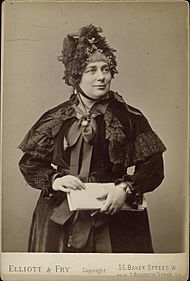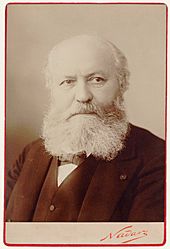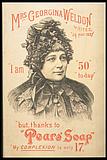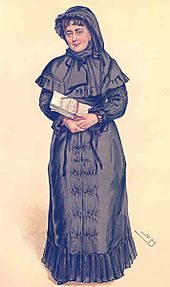Georgina Weldon facts for kids

Georgina Weldon (born Thomas; 24 May 1837 – 11 January 1914) was a British woman known for her many court cases and her talent as a singer. She lived during the Victorian era.
Contents
Early Life and Musical Dreams
Georgina was born in 1837 in Clapham Common, England. She was one of seven children. Her father, Morgan Thomas, was a Member of Parliament (MP) and a Justice of the Peace. He was a wealthy man. Georgina spent much of her childhood in Florence, Italy. Her mother taught her to sing.
In 1860, Georgina married William Henry Weldon. Her father did not approve and removed her from his will. Georgina wanted to become a professional singer. However, her husband, like her father, did not allow her to perform for money. She could only sing in amateur shows and charity concerts.
In 1870, her husband inherited a lot of money. He leased Tavistock House in Bloomsbury, London. This house had a small theatre, which had been added by the famous writer Charles Dickens.
Music and Legal Battles with Gounod

By 1869, Georgina's marriage was not going well. She started a plan to create a National Training School of Music. This school would teach music to children who were not wealthy. She even filled Tavistock House with orphans.
She also joined a famous choir. Through this, she met the French composer Charles Gounod in 1871. Georgina's singing career grew because of her connection with Gounod. She sang solo parts in his music and published her own songs.
Gounod, who was not well, moved into Tavistock House with the Weldons in late 1871. However, in 1874, Gounod returned to France. Georgina felt upset by his departure. She refused to send his personal items back to him, including the draft of his opera Polyeucte. She only returned it later, after he had almost rewritten the whole piece. She then started several lawsuits against him. She tried to sue him for a large sum of money. She was even held in prison herself in 1880 and 1885 for legal issues related to her music career.
In one case in 1885, she was awarded £10,000 from Gounod. However, he refused to accept the court's decision, and she never received the money.
Fighting for Justice
By 1875, Georgina and her husband separated. He gave her the lease to Tavistock House and money each year. In 1878, her husband tried to stop these payments. He also tried to use Georgina's interest in spiritualism (the belief in communicating with spirits) to prove she was mentally unwell. He wanted her to be sent to a place for people with mental health issues.
Two doctors visited Georgina under false pretenses. They pretended to be interested in her music school. Then, they signed an order to have her taken away. Georgina realized what was happening. When people arrived to take her by force, she escaped. She avoided capture for seven days until the order expired.
She then went to court to accuse them of assault. The judge believed her and was convinced she was mentally sound. At that time, a married woman could not sue her husband in a civil court. However, Georgina told her story to newspapers. She wanted to provoke her husband and the doctors to sue her for libel (saying false things that harm someone's reputation).
In 1882, a new law called the Married Women's Property Act was passed. This law allowed married women to start civil lawsuits. Georgina then sued her husband. She also published a book about her orphanage and how she escaped the doctors.
Between 1883 and 1888, she successfully sued everyone involved in trying to have her committed in 1878. At one point in 1884, she had seventeen court cases happening at the same time! She always represented herself in court. She became known as the "Portia of the Law Courts." Her picture even appeared in an advertisement for Pears Soap. To pay for her legal battles, she sang at a music hall in London.
Later Years and Legacy
By the late 1880s, Georgina Weldon was not as famous. By 1900, she had brought over a hundred cases to court. She herself was sued for libel and spent time in Newgate Prison in 1880 and Holloway Prison in 1885. When she was released, thousands of people cheered for her. She kept her prison clothes and wore them when she gave speeches about improving the justice system and prisons.
In her later years, she lived in a convent in France for twelve years. She enjoyed gardening and wrote her life story. She also wrote books about her legal experiences. She tried to clear her name with Gounod's biographers in 1905 but was unsuccessful. In 1908, she published more songs.
Georgina Weldon spent her final years in London and Brighton. She passed away on 11 January 1914. She was buried in the family vault in St Dunstan's Church.
 | William L. Dawson |
 | W. E. B. Du Bois |
 | Harry Belafonte |



